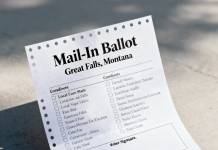Bozeman implemented a citywide ban on urban camping effective October 1, 2025, following years of escalating issues with homeless encampments on public streets and rights-of-way.
The ordinance prohibits sleeping, camping, or storing personal belongings in public spaces, with penalties including daily fines up to $500 and potential jail time of up to 10 days for repeat violations. This builds on a 2024 permit system that already restricted such activities, but the full ban marks the end of any temporary allowances.
Background and Lead-Up
The problem intensified during the COVID-19 pandemic, with urban camping peaking at around 244 people in July 2023, often in makeshift camps or vehicles due to a severe affordable housing shortage — where securing an apartment might require $3,500 to $5,000 upfront for first and last month’s rent.
This led to community complaints about safety, sanitation (including human waste removal and over 110 tons of trash hauled away), and criminal activities like drug use and disturbances. In October 2023, local business owners sued the city, claiming it failed to enforce existing laws, which pressured officials to act. The city spent over $220,000 on responses since 2022, excluding staff costs.
To prepare, Bozeman hired a dedicated manager in late 2023 who issued hundreds of warnings and citations, reducing the camper count by 90% to just 16 people in one remaining site by late September 2025.
Many relocated to private property, family homes, or public land outside city limits. A key support was the opening of the $16 million Homeward Point shelter about two weeks before the ban, providing 130 beds, meals, laundry, and day services—already housing over 100 people nightly, including more than 30 former urban campers.
Nearby Gallatin County also passed its own ban on public camping in July 2025, aligning with Bozeman’s efforts.
Impacts and Reactions
City officials express optimism that the ban will restore public spaces without solving broader homelessness, which continues to worsen in the region. Mayor Terry Cunningham noted in July that addressing camping is distinct from ending homelessness: “Anyone who thinks we are solving the homeless problem by addressing the urban camping problem is missing the reality.” The manager emphasized compassionate enforcement, focusing on connecting people to services like HRDC (a local nonprofit) rather than immediate arrests, but acknowledged some individuals resist help.
Among those affected, there’s significant concern. One long-time camper, John Wallace, who survived a violent attack in camp and works at a gas station, worries about fines derailing his housing search: “Honestly, I just want to get a place. That’s all I want to do … It’s getting bad.” Advocates highlight the shelter’s role but stress the ban doesn’t address root causes like housing costs.
Business leaders and some residents welcome the change, citing reduced nuisances since enforcement ramped up — from 300 campers down to 22 permitted ones earlier in 2025. Online discussions reflect broader anti-encampment sentiments, with one user praising community efforts to clear parks by confronting campers directly and involving law enforcement. However, critics argue such bans are “misguided” and lack support from police in some contexts, potentially just displacing people without solutions.
Overall, while the ban has cleared streets and directed some to shelters, it underscores ongoing debates: proponents see it as reclaiming public order, while opponents view it as punitive amid insufficient affordable housing.
Montana PBS plans a special on Bozeman’s homelessness efforts airing October 16, 2025.
sourced – Montana Free Press — Daily Montanan







